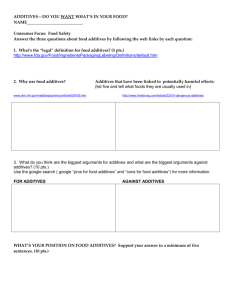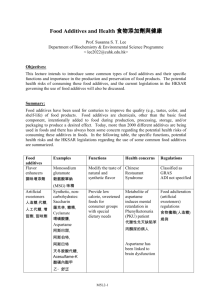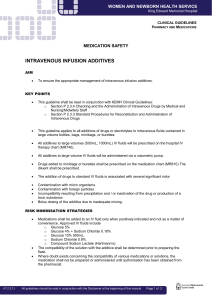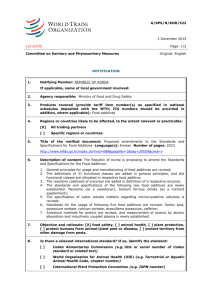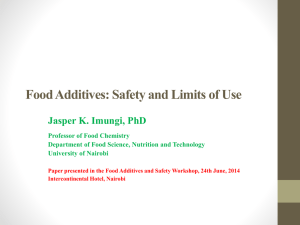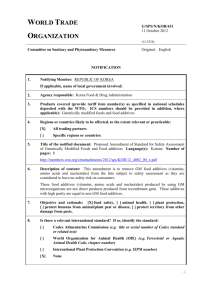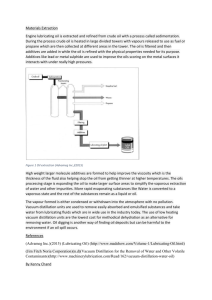Are all Gasoline Brands the Same
advertisement
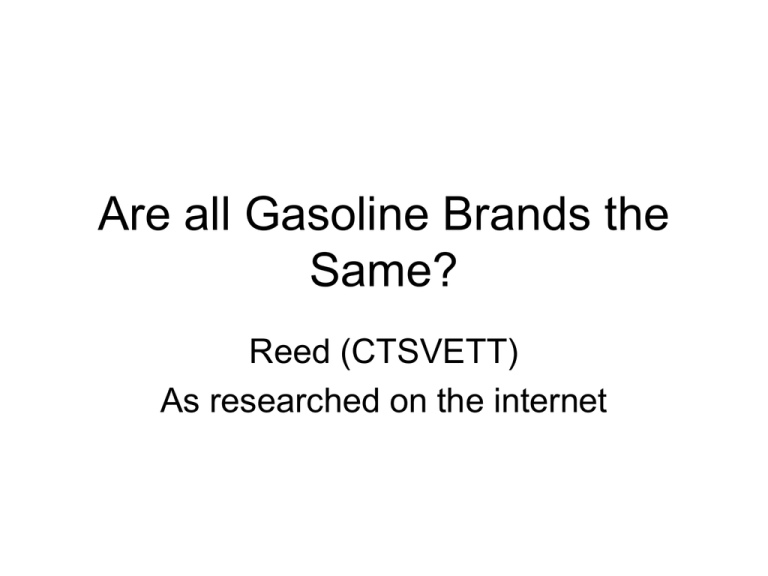
Are all Gasoline Brands the Same? Reed (CTSVETT) As researched on the internet Exec Summary • According to gasoline distributors, all gas is almost identical: it is a commodity and traded as such • Difference is in the additives that different manufacturers put in the gas • Additives (or detergents) help keep the injectors/ intakes/ valves clean • Level or station quality is also an issue • Cheaper gas usually means cheaper additive and less ability to keep your fuel system clean All Gas IS the same! • The distribution of Gas occurs on a mass scale through national pipelines. • All gas flows through common pipelines in the US to the distributors. • All of this gas must meet the minimum Federal gas quality requirement • In most cases, various brands actually are pumped from the same distributor • “Base gas is a freely traded commodity that must meet certain government specifications. It flows through common pipelines into commingled storage tanks” Gas DOES differ by region • For emissions reason, there is a different formulation of “base” gas by region. But it is different • Gas Differs in the additives that are put into the gasoline. • At the point of distribution (where the gas flows into the truck) different brands add different additives – Techron, Cleantech, etc – At a rate of “measured squirt” to 40 gallons • “The major brands spend R-and-D money on patented additives, which they add to the basic gas” What do the additives do • Chevron- Techron (most expensive additive) – “keeps combustion chambers free of deposits while "some of" its competitors' additives will increase these deposits” • Additives are patented formulations of chemicals intended to keep Valves, Intakes, and Injectors clean – Prevent build-up of varnish – Keep car operating as designed • Goal of additives “forming less deposits when the gasoline burns, for better mileage, performance and exhaust emissions” What the additives are: • octane-enhancing additives ( improve octane ratings ) • anti-oxidants ( inhibit gum formation, improve stability ) • metal deactivators ( inhibit gum formation, improve stability ) • deposit modifiers ( reduce deposits, spark-plug fouling and preignition ) • surfactants ( prevent icing, improve vaporisation, inhibit deposits, reduce NOx emissions ) • freezing point depressants ( prevent icing ) • corrosion inhibitors ( prevent gasoline corroding storage tanks ) • dyes ( product colour for safety or regulatory purposes ). Clogged injectors based on type of injectors • Early Bosch style most prone to clogging – Used until 1989 • In 1989 GM introduced the “Multec” injector – Ball style spray valve – Less prone to clogging • Injector has very small orifice – Very little residue can clog injectors • Goal is to keep orifice clean and promote “Cone shaped” spray pattern for best combustion What happens if the injector is Clogged • When injector is clogged, Gas tends to “stream” versus “Spray” • This causes the combustion to be less efficient – Loss of fuel economy – Poor performance (stuttering/loss of acceleration) • Goal is a “Cone shaped Spray” for maximum efficiency How to keep injectors Clean • Using fuel tank additives (one bottle/tank) – Expensive – Harsh on other parts of the engine • Ritual Cleaning of injectors – Very expensive (requires removing the injector from the car and cleaning) • New Injectors – Up to $100 each (x the number of cylinders you have: example: $800 + labor for a V8) • Using Fuel additives (techron, etc) that promote cleaning injectors. – Usually a few cents more per gallon – Continually clean the system – No extra effort Quality of Pumping Station also an Issue • When gas is dispensed at pump, it is run through filters • Some stations use single filters others use double • The more filtration the better because it removes impurities from the fuel before it enters your car • Cheaper stations do not change the filter as often or use single filtration Which stations Cheat on you? • Some stations also cheat – Sell you 87/89 instead of 91 – Improperly charge in contradiction to what the price is marked • Survey paramters: – 875 stations surveyed out of population of over 10,000 stations – Mixed branded (Exxon, Mobil, Chevron,etc) versus independent stations • Results of survey: – Branded stations have a .4% higher overall compliance – Independent stations had a .47% higher chance of charging you more than marked – Independent’s had a 10% higher storage tank violation- leads to dirtier gasoline • Bottom Line: DON’T USE INDEPENTENTS! Source: Department of measurement standards: California So, why not Arco? • “Most suppliers of quality Gasolines will formulate similar additives into their products, and cheaper product lines are less likely to have such additives added” • This means Cheaper gas: cheaper additive Summary • This does not mean spend more on gas, it merely explains why Arco/wal-mart/etc (cheaper brands of gas) causes engine problems later in the cars life or can cause engine issues • However, if you plan to clean your fuel system often or are willing to pay later, use the cheap gas now. • Personally: I would rather spend a few cents more a gallon now, than deal with expensive problems later down the road! • Bottom line: YOU DECIDE!!! References • What Arco Says (marketing at its finest) – http://www.arco.com/gas/faqs.html • What Chevron has to say: – http://www.chevron.com/prodserv/fuels/techrongas/faq.shtml • The nitty gritty of Gaoline Composition – http://www.faqs.org/faqs/autos/gasoline-faq/part2/preamble.html • The Dept of Measures Survey – http://www.cdfa.ca.gov/dms/pdfs/P-01-2.pdf • Articles: – http://www.jsonline.com/wheels/peak/feb03/119491.asp?format=print – http://www.nctimes.com/news/2001/20011223/61014.html • What damage it causes from Yahoo Auto Repair – http://autos.yahoo.com/repair/results/ques076.html
